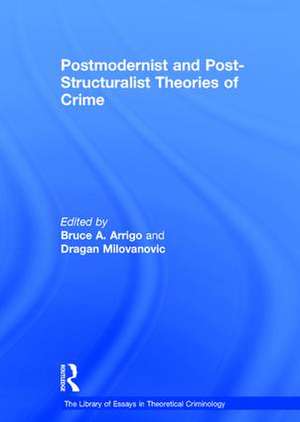Postmodernist and Post-Structuralist Theories of Crime: The Library of Essays in Theoretical Criminology
Autor Dragan Milovanovic Editat de Bruce A. Arrigoen Limba Engleză Hardback – 24 aug 2010
Preț: 1586.14 lei
Preț vechi: 2204.18 lei
-28% Nou
Puncte Express: 2379
Preț estimativ în valută:
303.60€ • 329.89$ • 255.19£
303.60€ • 329.89$ • 255.19£
Comandă specială
Livrare economică 31 martie-14 aprilie
Doresc să fiu notificat când acest titlu va fi disponibil:
Se trimite...
Preluare comenzi: 021 569.72.76
Specificații
ISBN-13: 9780754629276
ISBN-10: 0754629279
Pagini: 538
Dimensiuni: 169 x 244 x 40 mm
Greutate: 1.27 kg
Ediția:1
Editura: Taylor & Francis
Colecția Routledge
Seria The Library of Essays in Theoretical Criminology
Locul publicării:Oxford, United Kingdom
ISBN-10: 0754629279
Pagini: 538
Dimensiuni: 169 x 244 x 40 mm
Greutate: 1.27 kg
Ediția:1
Editura: Taylor & Francis
Colecția Routledge
Seria The Library of Essays in Theoretical Criminology
Locul publicării:Oxford, United Kingdom
Cuprins
Contents: Introduction; Part I Theoretical Developments and Integrations: Constitutive criminology: the maturation of critical theory, Stuart Henry and Dragan Milovanovic; The peripheral core of law and criminology: on postmodern social theory and conceptual integration, Bruce A. Arrigo; Post modern criminology: mapping the terrain, Dragan Milovanovic; The French connection: implications for law, crime and social justice, Bruce A. Arrigo, Dragan Milovanovic and Robert C. Schehr. Part II Critical Applications in Law, Crime, Justice and Social Change: Nome law: Deleuze and Guattari on the emergence of law, Jamie Murray; Advancing science and research in criminal justice/criminology: complex systems theory and non-linear analyses, Jeffery T. Walker; The power of community mediation: government and formation of self-identity, George Pavlich; Chaos theory and human agency: humanist sociology in a postmodern era, T.R. Young. Part III Transformational Analyses and Marginalized Identities: From restoration to transformation: victim-offender mediation as transformative justice, Robert Carl Schehr; Determinate sentencing: a feminist and postmodern story, Nancy A. Wonders; The abrogation of subjectivity in the psychiatric courtroom: toward a psychoanalytic semiotic analysis, Christopher R. Williams; Creating the responsible prisoner: federal admission and orientation packs, Mary Bosworth; Against 'green' criminology, Mark Halsey. Part IV International, Transnational and Post-National Directions: 'Let them eat cake': globalization, postmodern colonialism, and the possibilities of justice, Susan S. Silbey; Alternatives to what kind of suffering? Towards a border-crossing criminology, Ronnie Lippens; Doing newsmaking criminology from within the academy, Gregg Barak. Part V Postmodern and Post-Structural Criminology and its Interlocutors: Postmodernism, protest, and the new social movement, Joel F. Handler; Postmodern thought and criminological discontent: new metaphors for understanding violence, Martin D. Schwartz and David O. Friedrichs; Name Index.
Notă biografică
Bruce A. Arrigo is Professor, Department of Criminal Justice and Criminology, University of North Carolina at Charlotte, USA and Dragan Milovanovic is Professor, Justice Studies Department, Northeastern Illinois University, USA
Descriere
This volume presents the historical, theoretical, methodological, and applied developments within affirmative postmodern and post-structural criminology. This includes the evolution of thought that embraces the 'linguistic turn' in crime, law justice, and social change. The articles are classic contributions written by key thinkers and together they represent important reflections on the current criminological landscape in which symbolic, linguistic, material, and cultural realms of analyses are featured.











